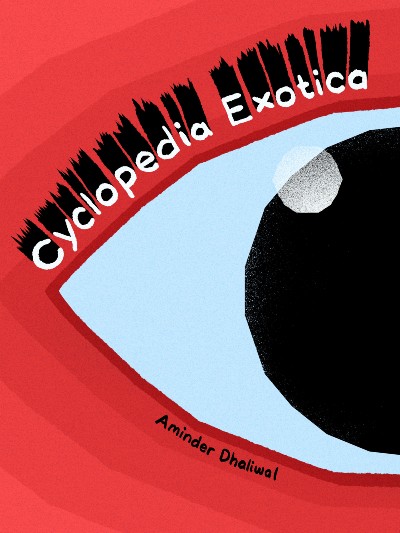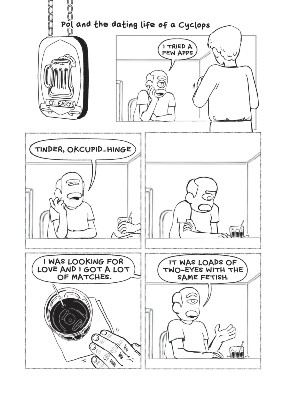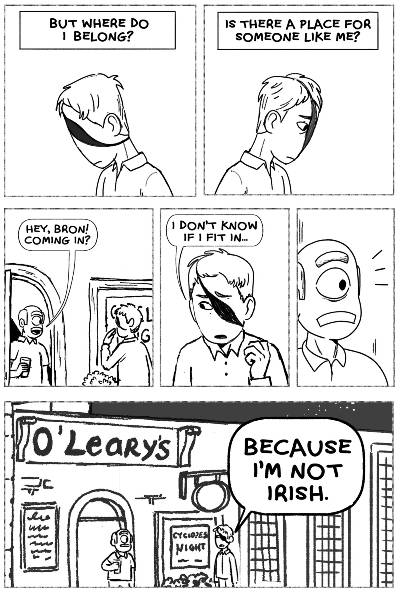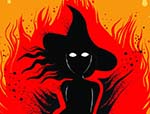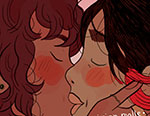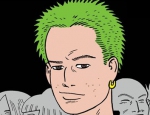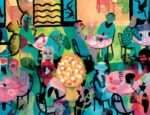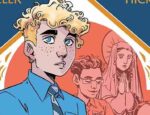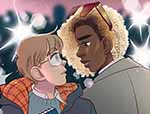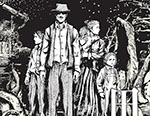Brampton, in Canada’s province of Ontario, is home to one of the largest groups of immigrants in the country. It often makes the list of most diverse cities in North America, and this is where Aminder Dhaliwal was born a little over three decades ago. It is simplistic to assume that her work as a cartoonist is defined by her experience as the child of immigrants, but it is also hard to eliminate the impact of that experience on how she engages with the world. Every page of Cyclopedia Exotica, her second book, resonates with the perspectives of people who live on the margins.
This is a book about a community of cyclops — mythical one-eyed creatures from Greek mythology — who now walk among us. What Dhaliwal does, by using them as her protagonists, is hold a mirror to society’s attitudes towards anyone who doesn’t conform, be it people who are a shade darker, those who exhibit different sexual preferences, or those who follow a religious belief that is perceived to be at odds with Gods that the majority bow down to.
It is an undeniably clever approach, because Dhaliwal’s characters can comment on everything from that position as society’s underdogs; the outliers peeping in at the rest. There’s Etna, the cyclops who breaks down barriers by posing nude for Playclops magazine in 1978, turning a subspecies into an exotic, sexualised people in the process. There’s Bron, representing a cyclops who has tried, and failed, to reject his identity through experimental surgery. Then there is the interspecies relationship between Pari and Tim, who are preparing for parenthood and wondering what category their child will fall into. The artists Grae and Jian, twin sisters, shine a light on manufactured attitudes and how they drive realities in the marketplace, while Arj struggles with life after being bullied by a human being.
It is interesting, for a reader, to juxtapose Dhaliwal’s mini tales alongside those associated with arguably the most famous cyclops, Polyphemus. Homer portrayed this giant son of Poseidon as a man-eating monster, creating a trope that persists to this day.
Most of the panels come from Dhaliwal’s posts on Instagram, where she has been serialising these episodes for a while. There are some obvious pros and cons to this approach. On the one hand, it compels her to get to the point, as it were, by relying on pithy dialogue to highlight racism or throw daily microaggressions into sharp relief. On the other, this leads to a series of hits and misses, where some panels nail their targets and others clearly belong more in the realm of content meant for an app one scrolls through.
Having said that, the whole clearly is bigger than the sum of its parts, and Dhaliwal does manage to make some strong statements on what life as a second-tier citizen can feel like, from the inadvertent humour to subtle or overt discrimination, and the rank hypocrisy of those who pretend to engage with the other side.
Dhaliwal used her powerful debut, Woman World, to ask some intriguing questions about society and the place of women in it. With Cyclopedia Exotica, she brings her formidable skills as a writer and artist to ask more probing questions. At a time when more and more of us are beginning to evaluate our established values and question long-held belief systems, her work seems more relevant than ever.
Aminder Dhaliwal (W/A) • Drawn & Quarterly, $29.95 CAD/$24.95 USD
Review by Lindsay Pereira





